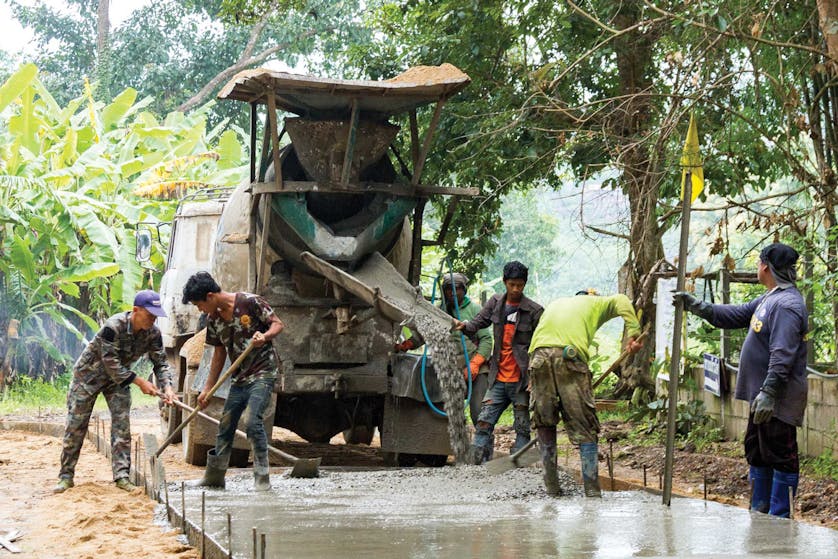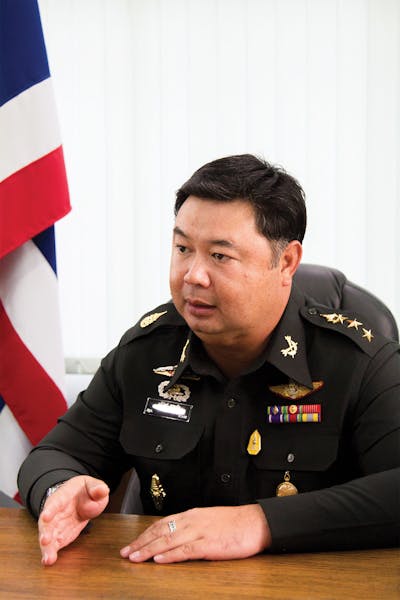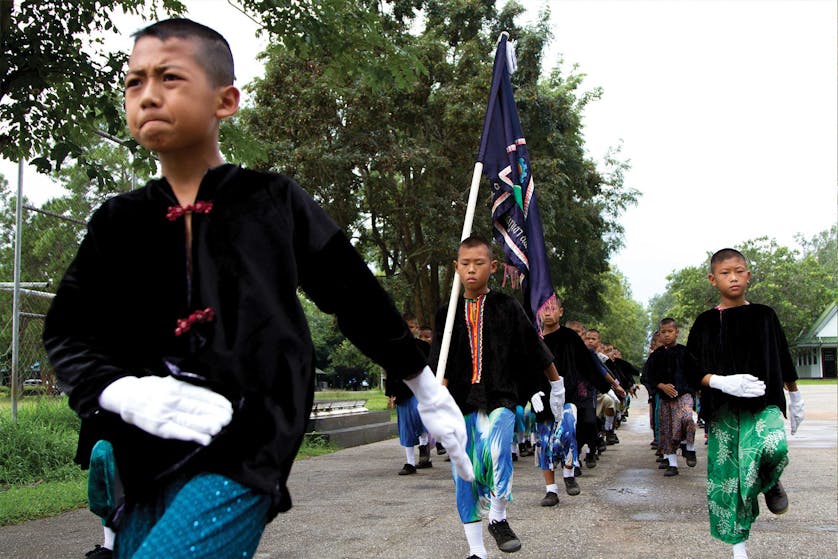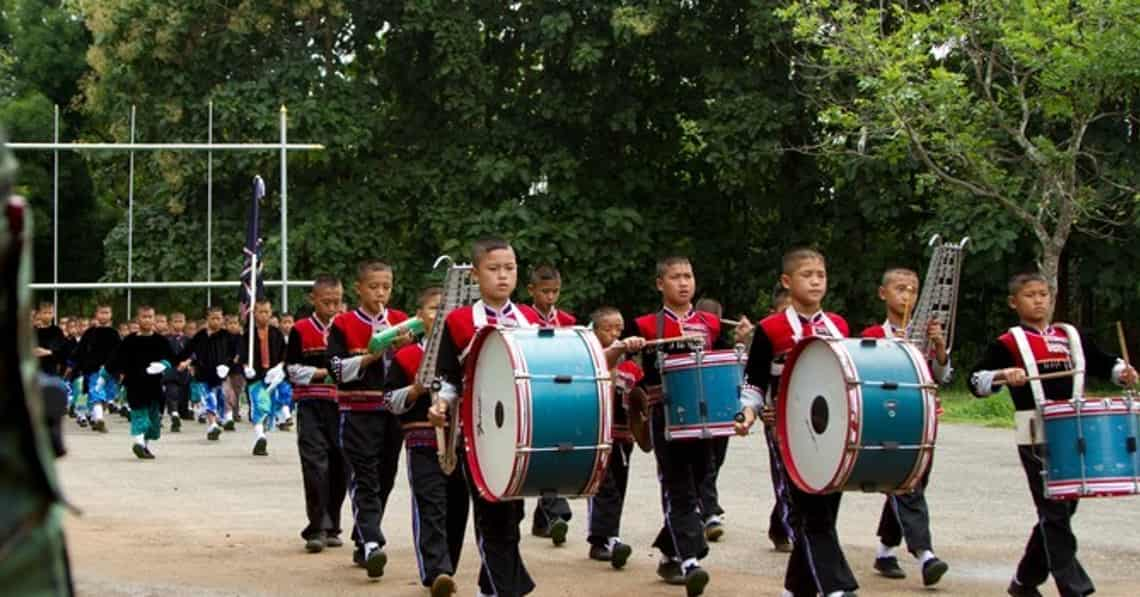To paraphrase Monty Python’s question of the Romans, ‘What has the army ever done for us?’ With 20 coups under their belts since the start of constitutional monarchy in 1932, endless meddling in politics, massive (and controversial) spending on military equipment and regular posturing over border issues, we often forget that the Royal Thai Army does in fact do a lot of work, especially in times of disaster and for those most in need for rural areas.

We were soberly reminded of this fact when sitting in our office one day, grumbling about the lack of freedom of speech under the current government, when our 15 year old intern quietly spoke up, “My dad is in the army, and he does a lot of good.” Rather embarrassed, we apologised for our insensitivity and soon learned that her father is Special Colonel Apirash Ramanat, Head of the Mobile Development Unit 32. Intrigued, we asked for a meeting and met up for an evening drink one day, learning that he heads a massive development unit whose prolific work we had to see for ourselves.
So, one day in late September I joined Col. Apirash at his headquarters in Chiang Dao to learn more about non-political aspects of the men in green.
Boys in Blue
On arrival at a remote outpost in Chiang Dao, I was confused to be greeted by men clad not in green, but blue. The North’s blue army, was founded in 1973 during the national campaign to eradicate communism through the hearts and minds of potentially sympathetic and often neglected people of the northern mountains.
Today’s objectives is to bring communities together, giving access to otherwise isolated villages and offer education to people whose access to knowledge and technology are limited.
The Armed Forces Development Unit based in Bangkok has, since 1973, been working without guns and without camouflage. “Our weapon is a tractor; you’ll see no rifles here,” said Col. Apirash as we walked around his post. “Our unit covers three provinces in the north of Thailand; Chiang Mai, Lamphun and Lampang.”
The reason the unit broke from traditional colours of green drab and camouflage was to separate themselves from what many at the time saw as an oppressive, anti-communist army. “At that time, there was a war going on between the state and the communists in the hills,” said Col. Apirash as he briefly explained the history of his unit. “We needed a peaceful way into the north, into the hills, to draw our community together as one country and to bring peace to the then unstable nation.” Suited up in uniforms that look similar to those of technical college students, they aimed to portray a unit of friendly, handyman-like officials, willing to roll up their sleeves and help out.
“Our unit is one of the best in Thailand,” boasted Col. Apirash, who has led the development of several projects unique to Unit 32.
Their overarching objectives focus on road building, agricultural education and development, water access and storage, community development, health care, education, public relations, and social welfare or ‘others’ which is basically responding to the needs of those he serves.
Road to Success
“This year we will have successfully completed all of our projects in the five border districts,” said Col. Apirash as he went on to say that those villages on Thailand’s border need the most support, supervision and defence. “Now pretty much every village in Chiang Dao, Fang, Mae Ai, Wieng Haeng and Chai Prakan is accessible by roads that we have built, and no village is without water.”
For Unit 32, road building is a big deal. Unlike other regions in Thailand, the north is full of isolated villages, sometimes without access by even a simple dirt track. Each year Unit 32 ensures that they build at least two or three concrete roads, and dozens of new dirt tracks, often winding through very rough mountain terrain. Road access is crucial to development as it offers access to markets, jobs, education, health and other necessities and opportunities.
This year, in celebration of HM the King’s 89th birthday, the Armed Forces Development Unit decided to build nine additional roads and nine schools in nine remote areas in His honour. Unit 32 was tasked with building two roads out of the nine, a fact that seemed to please Col. Apriash terribly. “One of these roads leads to a famous forest temple in Chiang Dao, and because it was so important, I decided to pave it all the way from the temple car park to the nearest concrete road.”

Unit 32 also provides water tanks, towers and pipelines to remote villages, and, upon request by village headmen, can refill the towers as and when needed — which becomes a daily routine during the drought season. “We even set up mini water treatment facilities so those in remote areas have access to clean drinking water without having to travel to buy bottles,” added Col. Apirash. A document listing the amount of water they gave to villages affected by drought throughout April and May this year showed a total of two million litres of water delivered to just two sub-districts in Chiang Dao…and that was just on page one.
While I was being offered quick glimpses at official documents, Col. Apirash began to list some of his other duties and initiatives, which fell under the ‘other’ category; basically whatever he deemed necessary. Last year alone, his unit dug reservoirs and pools for fish farming, repaired and extended electrical lines, provided free haircuts and free medical check-ups, donated warm coats and blankets during the cold season, and gave away livestock and seeds so that communities could become self-sustainable. This year they have already built over 1000 weirs along rivers that help prevent flooding and slows down water speeds to reduce the effects of erosion which could lead to mudslides.
“Although we encourage people who were once inaccessible to venture out and trade with the towns and cities, we still focus on helping villages become self-sustainable first, just like my King suggested.”
8000 Rai of Development
The Mobile Development Unit 32’s base covers over 8000 rai of land in Chiang Dao, and is covered in a vast range of development programmes that are free and open to the public to come and use, study and enjoy. An affable and calm man, Col. Apirash had an air of friendly openness which I found quite disarming. There was no rigid army posturing which I had come to expect and I passed a most pleasant day visiting schools, nodding sagely at weirs and admiring his roads.
“To be a serviceman at Unit 32, you need to have a special qualification that is suited to the projects we are working on,” said Col. Apirash, going on to say that the majority of staff at the unit are far more qualified than your average army grunt. “We bring in those with a background in agriculture, education, health and other kinds of unique fields of study so that our projects are not only successful but also enables us to teach and educate those who need it — further developing the country.”
Spanning across thousands of rai, exists a fully working set of agricultural projects ranging from livestock breeding, fish farming, plant growing and fertiliser production. Local communities are able to apply for education in, or the products of, these projects such as seeds, livestock or saplings. Every year, thousands of chickens, pigs and fish that are bred onsite are given away to those who ask for them, along with guides as to how to breed and increase livestock output resulting in both self-sufficiency and a chance to sell what is left to food companies and at markets. Owners of cattle can even call in the army’s own inseminator to help cross-breed healthy, strong offspring. “We offer a members’ card, ten sperms and you get a free gift,” laughed Col. Apirash at what surely must be one of his ‘others’ initiatives. He went on to say that this programme had been so successful that they have now opened up special ‘sperm stations’ in Lamphun and Lampang.
“We even have attractions for visitors,” he said, pointing to rather run down cabins and surrounding gardens. “We have a beautiful flower garden and reservoir that people can canoe or boat on, a few cabins for those wanting to stay overnight, and I even built a motocross track to help get the bike gangs off the streets.” The winter is the best time to visit, he explained, as the area gets spruced up in anticipation of visitors.

Unit 32 also has an onsite boys’ primary school, with 124 resident students that have come from hill tribes across the provinces. “Priority is given to those without much Thai language skill and for orphaned boys, for the rest a test must be passed to get into the school,” Col. Apirash explained. “It’s not a big school so we can’t take everyone but we make sure to have kids from all types of hill tribes, and we make a special effort to maintain and promote their unique cultures.” Each boy is dressed in his own tribe’s traditional dress, and they are encouraged to share their cultures with each other to help promote cohesion and understanding between themselves and with Thailand as a whole.
When I first pulled into the unit, I saw a parade of the school children marching Thai goosestep to the beat of a drum and a military melody. In perfect time, they suddenly halted before one of the older boys hopped towards the colonel headmaster of the school to salute him, only to then turn and shout a series of commands to the ranks. While Col. Apirash touts the inclusivity of the school, it is important to recall that decades before, the purpose of these schools were the exact opposite, they were formed to homogenise minorities and bring them into the standard central Thai fold. It is interesting to see how attitudes have changed, for the better.
“We teach the boys a regular curriculum interspersed with things like agriculture, breeding and the benefits of sustainable crop growth such as coffee instead of opium,” Col. Apirash added. “As opium growing is pretty much eradicated, the new focus is on deforestation. Although promoting self-sufficiency and improving access to hill tribe villages is a very good thing to be doing, it has led to the rapid growth of these communities that if left unchecked could destroy acres of forest though a simple lack of education. These boys are the village leaders of the next generation and must be educated in more than just their ABCs.”
A Good State of Affairs
What is clear is that the Armed Forces Development Unit does a lot of good for the people that arguably need it the most. Unit 32 is a beaming success story, often receiving the biggest budgets (the good colonel was a tad cagey as to his annual budget, professed to be in the tens of millions) and having the most projects out of any of the other units nationwide.
Founded during a time when the hill tribes and the communists that had escaped to the hills were considered enemies the state, the unit still displays strong pro-state, pro-army undertones that pave the way for criticism and suspicion that their motives are not as altruistic as they may try to suggest. But when it comes down to pure results there is no denying that The Armed Forces Development Unit has left thousands of the North’s most needy people better off, better educated and in much better health.
So apart from the sanitation, the medicine, education, irrigation, roads and fresh water system, and public health, what has the army ever done for us? The Romans still have one up, according to Monty Python…they did give us wine.
